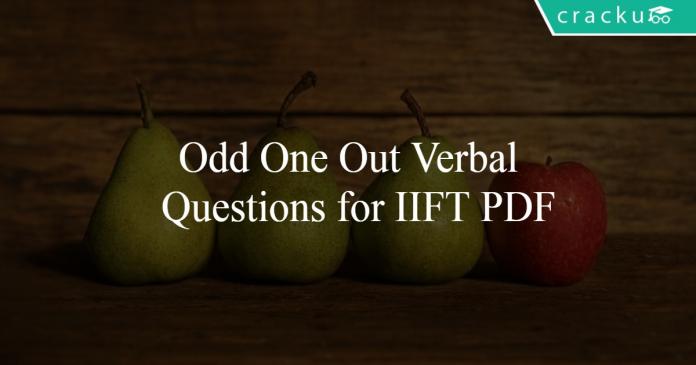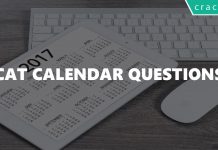Odd One Out Verbal Questions for IIFT PDF
Download important IIFT Odd One Out Verbal Questions PDF based on previously asked questions in IIFT and other MBA exams. Practice Odd One Out Verbal Questions and answers for IIFT and other exams.
Download Odd One Out Verbal Questions for IIFT PDF
Get 5 IIFT mock tests for Rs. 299. Enroll here
Download IIFT Previous Papers PDF
Take IIFT Mock Tests (With Solutions)
Question 1: Five sentences are given below. These sentences, when rearranged properly, form a logical and meaningful paragraph. Rearrange the given sentences and enter the correct order as the answer.
1. Luther certainly posted on the door of the church at Wittenberg his famous Theses, and burnt the Papal Bull at the gates of that city; yet before Luther there lived men, such as the scholar Erasmus, who have been appropriately named Reformers before the Reformation.
2. Haydn, for example, is called the father of the quartet; close investigation, however, would show that he was only a link, and certainly not the first one in a long evolution.
3. In history we find certain names associated with great movements: Luther with the Reformation, or Garibaldi with the liberation of Italy.
4. So, too, Cavour’s cautious policy paved the way for Garibaldi’s brilliant victories. Once again, Leonardo da Vinci is named as the inventor of chiaroscuro, yet he was preceded by Fra Filippo Lippi.
5. And in similar manner, in music, certain men are associated with certain forms.
Question 2: Five sentences are given below. These sentences, when rearranged in proper order, form a meaningful paragraph. Rearrange the sentences and enter the correct order as the answer.
1. The old planter took a great fancy to the boy, and offered to adopt him also, but young John Paul preferred the adventurous life of the ocean to humdrum existence on a Virginia plantation.
2. Little John Paul had a short childhood, for as soon as he could handle a line, he was put to work with the fishermen on Solway Firth to help earn a living for the family.
3. Securing his father’s consent, he shipped as apprentice for a voyage to Virginia, and visited his brother, who was managing his adopted father’s estate near Fredericksburg.
4. For the next fifteen years, he followed the sea, studying navigation and naval history, French and Spanish, and fitting himself in every way for high rank in his profession.
5. By the time that he was twelve years old, he was a first-class sailor, and had developed a love for the sea and a disregard of its perils which never left him.
a) 23154
b) 25314
c) 25431
d) 24531
Question 3: Five sentences are given below. Four of these, when rearranged properly, form a logical and meaningful paragraph. Identify the sentence which does not belong this paragraph and enter its number as the answer.
1) The nearest railway station, Duxby Junction, to which steam and electricity continually carried the news of the world, was fully twenty miles distant.
2) The nearest market town was Shunton, the sturdy farmers going there on market days sold their cattle and wheat, picked up small items of news as had drifted thither from Duxby.
3) Garsworth was one of those queer, old-fashioned villages which, owing to their isolated positions, yet retain the primitive simplicity of earlier ages.
4) The village, built on a primitive plan, consisted of one long, wide street, with a similar one running crosswise to it, so that the little town was divided into four almost equal sections.
5) There was not even a stage-coach to Duxby, and the only means of communication was by the carriers’ carts, which went weekly along the dusty high road, drawn lazily by their sleek horses.
Question 4: Five sentences are given below. These sentences, when rearranged properly, form a logical and meaningful paragraph. Rearrange the sentences and enter the correct order as the answer.
1.But her death, which happened ten years before his own, produced a great alteration in his home; for to supply her loss, he invited and received into his house the family of his nephew Mr. Henry Dashwood, the legal inheritor of the Norland estate, and the person to whom he intended to bequeath it.
2.Their estate was large, and their residence was at Norland Park, in the centre of their property, where, for many generations, they had lived in so respectable a manner as to engage the general good opinion of their surrounding acquaintance.
3.In the society of his nephew and niece, and their children, the old Gentleman’s days were comfortably spent.
4.The late owner of this estate was a single man, who lived to a very advanced age, and who for many years of his life, had a constant companion and housekeeper in his sister.
5.The family of Dashwood had long been settled in Sussex.
Question 5: Five sentences are given below. These sentences, when rearranged in proper order, form a meaningful paragraph. Rearrange the sentences and enter the correct order as the answer.
1. War seemed inevitable, yet the temporizing continued.
2. The arming of troops proceeded without check, and hostile cannon were defiantly pointed at federal forts.
3. The South went on seizing forts and plundering arsenals, terrorizing union sentiment, and threatening the federal government.
4. It was an eventful winter that preceded the breaking out of the war between the states.
5. The salient feature of the time, apart from the excitement, was the uncertainty.
Question 6: Five sentences are given below. These sentences, when rearranged in proper order, form a meaningful paragraph. Rearrange the sentences and enter the correct order as the answer.1) Usually women had no rights of inheritance, though in some cases they could inherit when there were no male children, and in others they could transmit the right of inheritance to their male descendants.
2) The position of woman among the northern races that overthrew the Roman power was wholly different from that which she held in the more ancient epoch, but even under the newer regime it was no enviable one.
3) That this was a recognized practice is shown in the laws of Ethelbert, which state that if a man carry off a freeman’s wife, he must at his own expense procure another for the injured husband.
4) Sometimes they were allowed to inherit movable property of a certain sort, probably largely the result of their own handiwork.
5) In many of the earlier Germanic systems, wives were bought by a definite payment of goods or of cattle.
Question 7: Five sentences are given below. These sentences, when rearranged in proper order, form a logical and meaningful paragraph. Rearrange the sentences and enter the correct order as the answer.
1. Long before Democracy as now understood was anywhere established, long before the American colonies became the United States, England was divided between Tory and Whig.
2. The party system is an essential instrument of Democracy.
3. The party is, moreover, a forerunner of Democracy, for parties have everywhere preceded free government.
4. And it was only after centuries of bitter political strife, during which a change of ministry would not infrequently be accompanied by bloodshed or voluntary exile, that England finally emerged with a government deriving its powers from the consent of the governed.
5. Wherever government rests upon the popular will, there the party is the organ of expression and the agency of the ultimate power.
Question 8: Five sentences are given below. Four of these, when rearranged properly, form a logical and meaningful paragraph. Identify the sentence which does not belong to this paragraph and enter its number as the answer.
1) Sir Launcelot, under the pretence of illness, remained behind.
2) The astonishment of the spectators was extreme, for it was thought that no one but Sir Launcelot could possess such invincible force.
3) King Arthur proclaimed a solemn tournament to be held at Winchester.
4) He intended to attend the tournament in disguise; he mounted his horse, set off without any attendant, and, counterfeiting the feebleness of age, took the most unfrequented road.
5) The king, not less impatient than his knights for this festival, set off some days before to superintend the preparations.
Question 9: Five sentences are given below. Four of these, when rearranged properly, form a logical and meaningful paragraph. Identify the sentence which does not belong to this paragraph and enter its number as the answer.
1) Thirty-four volumes of these appeared between 1702 and 1776.
2) After Ignatius Loyola formed the Society of Jesus in 1539, he required that his missionaries send back detailed letters describing their activities and the peoples and places they encountered.
3) The Jesuit accounts of far-flung lands were widely read during the Enlightenment, serving, for example, as important sources for Denis Diderot and Jean le Rond d’Alembert’s seminal Encyclopédie.
4) Like so many of his works, it was hailed by some and condemned by others.
5) In France, over the course of the eighteenth century, these were gathered together and published as Lettres édifiantes et curieuses.
Question 10: Five sentences are given below. These sentences, when rearranged in proper order, form a logical and meaningful paragraph. Rearrange the sentences and enter the correct order as the answer.1. On that occasion, all sorts and conditions of men were represented, from the religious enthusiast, to the ignorant bigot, and from the rich man who was sacrificing his all in the cause that he believed to be right, to the tramp and ne’er-do-well, who had allied himself with that cause for revenue only.2. About half a century ago one of the most remarkable pilgrimages of modern times took place. 3. History tells us of bands of crusaders who tramped across Europe in order to rescue the Holy Land from tyrants and invaders. 4. But the distance traversed by the crusaders six or seven hundred years ago was insignificant compared with the distance traversed by the pilgrims to whom we are referring.5. Across what was then, not inaptly, described by writers as an arid and repulsive desert, there advanced a procession of the most unique and awe-inspiring character.
Get Complete MBA Test Series for Rs. 799
Answers & Solutions:
1) Answer: 31452
On carefully reading the sentences, we see that the author wants to draw analogies about how the great people in different fields were not the first in their respective fields. Sentence 3, which introduces this topic, should be the opening sentence of the paragraph. In sentence 3, the author names Luther and Garibaldi. In 1 and 4, he explains how these men were preceded in their field by others. Hence, 3-1-4 are linked. Sentences 5 and 2 also form a pair as the author extends the same analogy to the music and mentions Hayden as an example. 31452 forms a meaningful paragraph.
2) Answer (B)
On carefully reading the sentences, we see that the paragraph is about John Paul. Hence, sentence 2 which introduces the main character of the passage, should be the opening sentence of the paragraph. Sentence 5 follows the chronological order and should immediately follow sentence 2. Sentences 3 and 1 form a pair as the old planter in 1 refers to Paul’s brother’s adopted father. Hence, the order should be 31. Sentence 4 should be the concluding line of the passage and should follow 1 as it mentions what Paul did after choosing the adventurous life of the ocean. 25314 forms a coherent paragraph.
3) Answer: 4
On reading the sentences, we understand that the paragraph is about the village Garsworth and how isolated (poorly connected) place it was.
Sentence 3 which introduces the village first must be the starting sentence.
Sentence 1 must follow the first sentence as it introduces Duxby junction and shows how far it was from Garsworth village.
Sentence 5 which explains poor connectivity between Duxby and Garsworth must succeed sentence 1.
Sentence 2 which gives other place/market which was nearest to Garsworth must be part of the passage and must follow sentence 5.
Sentence 4 which describes the streets in the village is not related to what other sentences convey which is the isolation of village Garsworth. Hence sentence 4 is the one which is out of context.
4) Answer: 52413
After reading the sentences, we see that the paragraph is about the Dashwood family and how they had come to live at their current estate. Therefore, sentence 5, should be the opening sentence. Sentence 2, which introduces the estate should come next. We see a link between 4 and 1 where the “her” in 1 refers to the “sister” in 4. Hence, 4-1 form a pair. 3 logically continues the thought mentioned in 1. Hence, the order should be 52413.
5) Answer: 45132
The paragraph talks about the winter before the war broke out between the states. Hence, sentence 4, which introduces the time should be the first sentence. “The time” mentioned in 5 is the winter mentioned in 4. Hence, 5 should come immediately after 4. We see that 3-2 together describe the South’s behaviour. Sentence 1 acts as connector between 45 and 3-2. Hence, the order is 45132.
Take IIFT Mock Tests (With Solutions)
6) Answer: 25314
The passage should start with sentence 2 as it introduces us to the topic of discussion i.e. the stature of women in the society. In this sentence, the author states that although the stature in newer regime was different than it was in past, it wasn’t good as well.
Sentences 5 and 3 form a pair. Sentence 5 describes the buying of wives in the early Germanic system and sentence 3 takes that idea forward.
Similarly, sentences 1 and 4 also form a pair. Sentence 1 talks about the inheritance rights women had in these times and 4 builds upon that premise and lists out other details regarding it.
So, 2 different combinations are possible- 2-5-3-1-4 and 2-1-4-5-3.
But among the two, the former gives a better flow of ideas. The first sentence talks about the differences and similarities in various eras. Sentence 5 starts with “In many of the earlier Germanic systems”. So, a transition from 2 to 5 makes more sense than transition from 2 to 1-4 and then to 5. It is unlikely that the author will come back to discussion of various eras after having discussed other things.
Thus, the correct sequence is 25314.
7) Answer: 25314
On carefully reading the given sentences, we see that the relationship between political parties and democracy is the subject of the paragraph. Sentence 2 introduces the topic. Hence, it should be the opening line of the paragraph. Sentence 5 should follow sentence 2 as it mentions the role of the party. Sentences 3 and 1 form a pair, as they explain how formation of parties precede establishment of democracy. Sentence 4 concludes the paragraph by mentioning how England finally came to deriving its powers from the consent of the governed. 25314 forms a coherent and meaningful paragraph.
8) Answer: 2
On carefully reading the sentences, we see that the topic of discussion is a tournament which Sir Launcelot wanted to attend in disguise. Thus sentence 3 which introduces the topic must be the introductory sentence. Sentence 5 further elaborates by stating that the king left for the tournament some days before. Thus 5 logically follows 3. Sentence 1 introduces Sir Launcelot and sentence 4 talks about his intention to attend the tournament in disguise. Thus 14 is a pair and must come after 5. Statement 2 has no logical connection with any of the other sentences and hence is out of context.
9) Answer: 4
On carefully reading the sentences, we see that the topic of discussion is about Jesuit accounts being gathered and published as books of different volumes. Thus sentence 2 which introduces the topic of discussion must be the starting sentence. ‘These’ in sentence 5 refers to letters which are described in 2. Hence, 5 must follow 2. Sentence 1 further gives details about Lettres édifiantes et curieuses by stating that there were 34 volumes. Thus, 1 must follow 5. Sentence 3 concludes the passage by stating where the accounts were used. Thus right order would be 2513. ‘His’ in sentence 4 requires a precedent and it is not logically connected to any of the other sentences. Hence, 4 is the odd sentence.
10) Answer: 25314
A quick glance at all the sentences tells us that the paragraph is about the history of some pilgrimage activity. Thus, statement 2 makes the best opening sentence as it sets the context for the rest of the discussion. 2 talks about remarkable pilgrims and 5 describes why the author feels so. 3 mentions people trying to get rid of tyrants from their holy land. 1 mentions the composition of these people. Hence, 1 must come after 3. 5 concludes the paragraph by mentioning how the distance traversed by pilgrims was more than the distance traversed by these Crusaders. The correct order is 25314.
IIFT Previous year question papers PDF
We hope this Odd One Out Verbal questions and answers for IIFT PDF will be helpful to you.




![CAT Averages Questions PDF [Important Questions] CAT AVERAGES Questions PDF](https://cracku.in/blog/wp-content/uploads/2022/07/CAT-AVERAGES-Questions-PDF-218x150.png)
